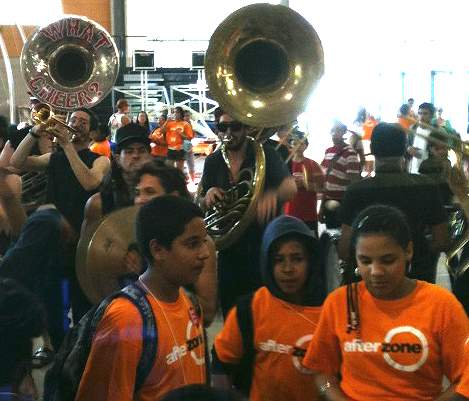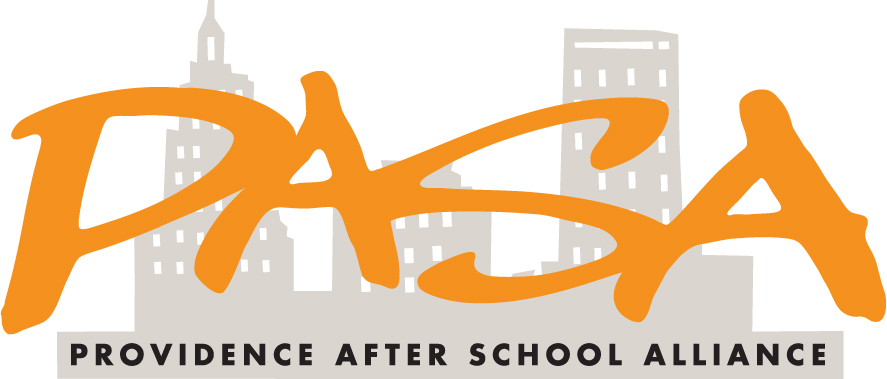

Pictured Above: Thanks to the What Cheer? Brigade and Big Nazo for providing heart-pumping entertainment (PASA’s STEM Coordinator Rob Pecchia can be seen blowing his horn on the left)
Last Thursday, PASA, its partner program providers, and nearly 600 middle school students and their families had a blast celebrating another amazing year in the AfterZone! Alexander Sidorkin, Dean of the School of Education at Rhode Island College was among many special guests that attended. Check out what he had to say on his blog (re-posted below).
The Other Education
reposted from The Russian Bear’s Diaries
Yesterday, I saw the Providence AFTERZONE end-of-the-year celebration. There was an Aikido club, a soccer club, a few art and crafts groups, a noisy group of kids wearing monster masks, a guitar studio, a dance group, the Save the Bay, the natural history museum, and so many others – I cannot list them all. And of course, a few hundred kids were bussed in to showcase their work, and to play in the inflatable obstacle course. In education, I am more impressed by things that appear normal, by the phenomena that feels “as things should be.” Let me call this the sense of elated normality. We all have a sense of good life in us, a certain instinct to recognize when things go right. But there is a narrower subset of the same sense as applied to the world of childhood and learning; you know a good educational experience when you see it.
Coincidentally, I am trying to work on a paper for a new journal called Other Education that is going to cover forms of education outside traditional schooling. This made me think about a profound damage to American education that was done and is continued to be done by the Back-to-basics thinking. In business, if you want to improve the quality and efficiency, you concentrate on your core production process, and let go of all extraneous things. Well, this is not exactly true even for business, but alas education was influenced not by real business people, but by business gurus. So the thinking went – if you want kids to learn more math, then spend more time and money on learning math, and less time on fluff like dance groups and a bead jewelry clubs. And while we are at it, let’s also cut recess to only a few minutes, and oh, let the junior high band go, too, for it is very expensive and we have another round of cuts.
But this is not how education works. If you are after the core skills such as literacy and numeracy, the road to them is indirect. For certain developmental reasons, it is especially so in the middle school. The road goes through relationships. You need first to latch on children’s interests, then build a relationship with students, and only then can you ask – oh, why don’t we also learn some algebra. One of the core problem affecting education is, unfortunately, the democracy itself. Most educational professionals will recognize the need for afterschool and summer programming immediately. If you want to be a hard-nosed pragmatic, you need to see the “fluff” as the educational infrastructure and the hard skills as a product. Unfortunately, the lay boards and politicians that run education in this country find that reasoning hard to understand. I have to admit that even within our profession, some people with experiences limited to just schools and classrooms do not understand it either. Hence the generation of partially blind educational reformers hammering away at accountability solutions.
An economic analogy would be this: you can invest all you want in food production, but if you don’t have any roads to get food from growers to consumers, you cause both food shortages and waste. In education, the path through children’s interests to relations IS the only road to deliver learning to them. We neglect, defund, and actively destroy the road, and pump all resources we can muster into the production. But if children or their minds are not in the classroom, they won’t learn no matter how hard the teacher tries and how skillful she or he is.
This is why I experienced the sense of elated normality yesterday. Our state has one of the most innovative and organized afterschool communities in the country, and this is one achievement we can be proud of. PASA wants to sign every middle-schooler in the city who wants it to a Summer day camp, for free. This is how things should be. This society absolutely can afford it, even if school budgets must be cut to do that.
